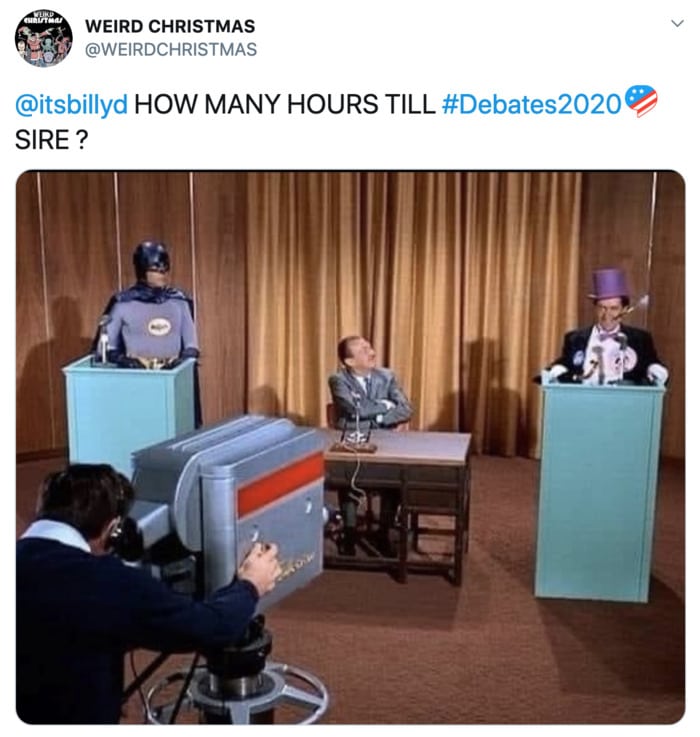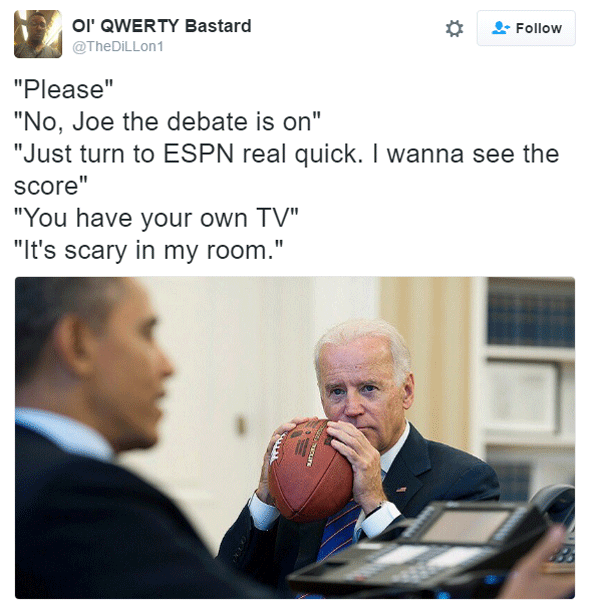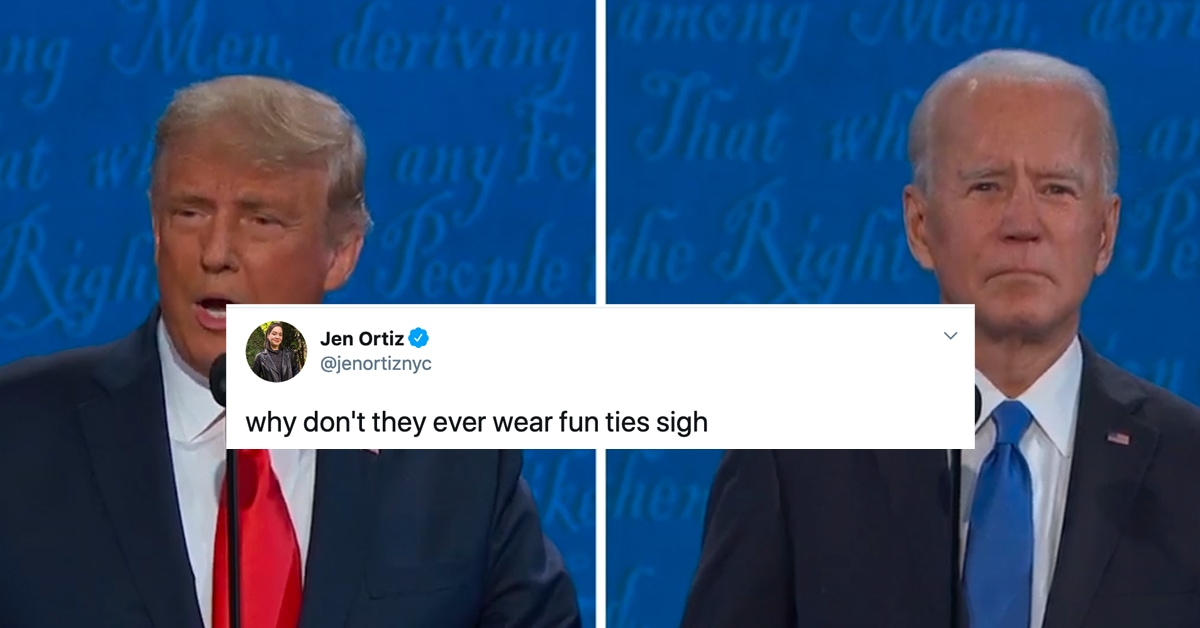In today's digital age, presidential debate tweets have become a pivotal tool for political discourse. As social media continues to shape how people consume information, understanding the role of tweets during debates is more important than ever. From real-time reactions to strategic messaging, these short snippets of text can influence public opinion and even sway election outcomes.
Presidential debates have long been a cornerstone of democratic processes, providing candidates an opportunity to articulate their vision and policies. However, the rise of social media has transformed how these events are experienced. Tweets, in particular, have emerged as a powerful medium for engagement and analysis, offering insights into public sentiment and political strategies.
Throughout this article, we will delve into the significance of presidential debate tweets, exploring their impact on political campaigns, public perception, and the broader democratic process. By examining key examples, strategies, and data, we aim to provide a comprehensive understanding of how these digital interactions shape modern politics.
Read also:Lexi Marvel Onlyfans A Comprehensive Guide To Her Career And Online Presence
Table of Contents
- The History of Presidential Debate Tweets
- The Role of Tweets in Modern Debates
- Impact of Presidential Debate Tweets
- Tactical Strategies in Crafting Debate Tweets
- Analyzing Public Sentiment Through Tweets
- Notable Examples of Presidential Debate Tweets
- Challenges and Controversies Surrounding Debate Tweets
- The Future of Presidential Debate Tweets
- Data and Statistics on Debate Tweets
- Conclusion and Final Thoughts
The History of Presidential Debate Tweets
The intersection of presidential debates and social media began to gain prominence in the early 2010s. Twitter, with its concise format, quickly became a platform where candidates, analysts, and the public could engage in real-time discussions. The first significant use of tweets during a presidential debate occurred during the 2012 U.S. election, when then-candidate Mitt Romney and President Barack Obama exchanged barbs via Twitter, setting the stage for future campaigns.
Since then, the role of presidential debate tweets has evolved significantly. What started as a supplementary medium has now become a central component of political communication. Candidates use tweets to amplify their messages, respond to opponents, and connect directly with voters. Meanwhile, the public relies on tweets to stay informed and participate in the democratic process.
Evolution of Political Communication
- 2012: First widespread use of tweets during debates.
- 2016: Increased reliance on social media for real-time updates.
- 2020: Heightened focus on digital strategies and viral content.
The Role of Tweets in Modern Debates
Presidential debate tweets serve multiple purposes in contemporary politics. They allow candidates to reach a broader audience, often bypassing traditional media filters. Moreover, tweets enable immediate engagement, enabling candidates to respond to unfolding events and clarify their positions. For the public, tweets provide a direct line to candidates, fostering a sense of accessibility and transparency.
Beyond their functional utility, presidential debate tweets also play a crucial role in shaping narratives. A well-crafted tweet can highlight a candidate's strengths, expose an opponent's weaknesses, or redirect attention to key issues. In this way, tweets serve as both a communication tool and a strategic weapon in the political arsenal.
Key Functions of Debate Tweets
- Real-time engagement with voters.
- Narrative control and message amplification.
- Direct communication with the public.
Impact of Presidential Debate Tweets
The influence of presidential debate tweets extends beyond mere communication. These tweets can shape public perception, influence media coverage, and even sway voter behavior. Studies have shown that tweets during debates often correlate with changes in poll numbers, underscoring their significance in the electoral process.
Moreover, the viral nature of tweets means that a single post can reach millions of people within minutes. This amplification effect can amplify both positive and negative messages, making it crucial for candidates to carefully craft their tweets. The potential impact of debate tweets highlights the importance of digital literacy and strategic communication in modern politics.
Read also:Sour Patch Adults The Ultimate Guide To Adult Versions Of A Childhood Favorite
Case Study: The 2016 Presidential Debate
During the 2016 U.S. presidential debates, tweets played a pivotal role in shaping public discourse. Candidate Donald Trump's use of Twitter to respond to opponents and engage with supporters became a defining feature of his campaign. Meanwhile, Hillary Clinton's team utilized tweets to highlight policy points and counter Trump's messaging. The contrasting strategies underscored the diverse ways in which presidential debate tweets can be employed.
Tactical Strategies in Crafting Debate Tweets
Creating effective presidential debate tweets requires a combination of strategic thinking and creative execution. Candidates and their teams must consider audience demographics, message clarity, and timing to maximize impact. Additionally, incorporating multimedia elements such as images or videos can enhance engagement and increase the likelihood of virality.
One effective strategy is to use tweets to highlight key moments during the debate. By emphasizing memorable quotes or powerful arguments, candidates can reinforce their message and create lasting impressions. Another approach is to engage directly with voters, addressing their concerns and answering their questions in real time.
Best Practices for Crafting Debate Tweets
- Focus on key messages and policy points.
- Utilize multimedia to enhance engagement.
- Respond promptly to unfolding events.
Analyzing Public Sentiment Through Tweets
Tweets provide valuable insights into public sentiment during presidential debates. By analyzing the language, tone, and themes of tweets, researchers can gauge how the public perceives candidates and their performances. Sentiment analysis tools further enhance this process, enabling detailed assessments of public mood and opinion trends.
Moreover, the volume and velocity of tweets during debates can indicate levels of engagement and interest. A surge in tweets following a specific moment or statement suggests that the issue resonated with the audience. This real-time feedback allows candidates to adjust their strategies and refine their messages.
Tools for Analyzing Debate Tweets
- Sentiment analysis software.
- Real-time monitoring platforms.
- Data visualization tools.
Notable Examples of Presidential Debate Tweets
Throughout history, certain presidential debate tweets have stood out for their impact and influence. One notable example is Donald Trump's tweet during the 2016 debates, where he described the event as "rigged." This tweet captured widespread attention and became a defining moment of the campaign. Similarly, Barack Obama's use of humor and wit during the 2012 debates helped solidify his image as a relatable and approachable leader.
These examples illustrate the power of presidential debate tweets to shape narratives and influence public perception. By leveraging the unique qualities of Twitter, candidates can create lasting impressions and connect with voters in meaningful ways.
Memorable Debate Tweets
- Donald Trump: "This election is totally rigged."
- Barack Obama: "This guy's just full of baloney."
Challenges and Controversies Surrounding Debate Tweets
Despite their benefits, presidential debate tweets also present challenges and controversies. The brevity of tweets often limits the depth of discussion, potentially oversimplifying complex issues. Additionally, the potential for misinformation and manipulation poses significant risks to the democratic process.
Moreover, the immediacy of tweets can lead to impulsive or poorly considered statements, which may have unintended consequences. Candidates must balance the need for rapid response with the importance of thoughtful communication. Addressing these challenges requires a commitment to transparency, accountability, and digital literacy.
Addressing Challenges in Debate Tweets
- Promoting digital literacy among candidates and voters.
- Encouraging thoughtful and measured communication.
- Combating misinformation through fact-checking initiatives.
The Future of Presidential Debate Tweets
As social media continues to evolve, the role of presidential debate tweets is likely to expand further. Emerging technologies such as artificial intelligence and augmented reality may enhance the way tweets are created, consumed, and analyzed. These advancements could revolutionize political communication, offering new opportunities for engagement and interaction.
However, with these opportunities come new challenges. Ensuring the integrity and authenticity of tweets will remain a critical concern, requiring ongoing efforts to combat misinformation and promote transparency. The future of presidential debate tweets will depend on the ability of candidates, platforms, and the public to navigate these complexities responsibly.
Emerging Trends in Debate Tweets
- Integration of AI-driven analytics.
- Augmented reality experiences for voters.
- Enhanced focus on digital security and authenticity.
Data and Statistics on Debate Tweets
Data plays a crucial role in understanding the impact of presidential debate tweets. Studies have shown that tweets during debates often correlate with changes in poll numbers and media coverage. For example, a 2020 study found that candidates who actively engaged on Twitter during debates experienced higher levels of public engagement and media attention.
Moreover, the volume of tweets during debates has steadily increased over the years, reflecting the growing importance of social media in political discourse. This trend underscores the need for candidates to develop robust digital strategies and invest in data-driven decision-making.
Key Statistics on Debate Tweets
- 2016: Over 17 million tweets during the first presidential debate.
- 2020: Average of 20 million tweets per debate.
- 2022: Increased focus on multimedia content and engagement metrics.
Conclusion and Final Thoughts
In conclusion, presidential debate tweets have become an integral part of modern political communication. By offering real-time engagement, strategic messaging, and direct access to voters, tweets have transformed the way debates are experienced and analyzed. As social media continues to evolve, the role of tweets in shaping political discourse is likely to expand further.
We invite readers to share their thoughts and experiences with presidential debate tweets in the comments section below. Additionally, we encourage you to explore other articles on our site for more insights into the intersection of politics and technology. Together, we can foster a more informed and engaged electorate.


